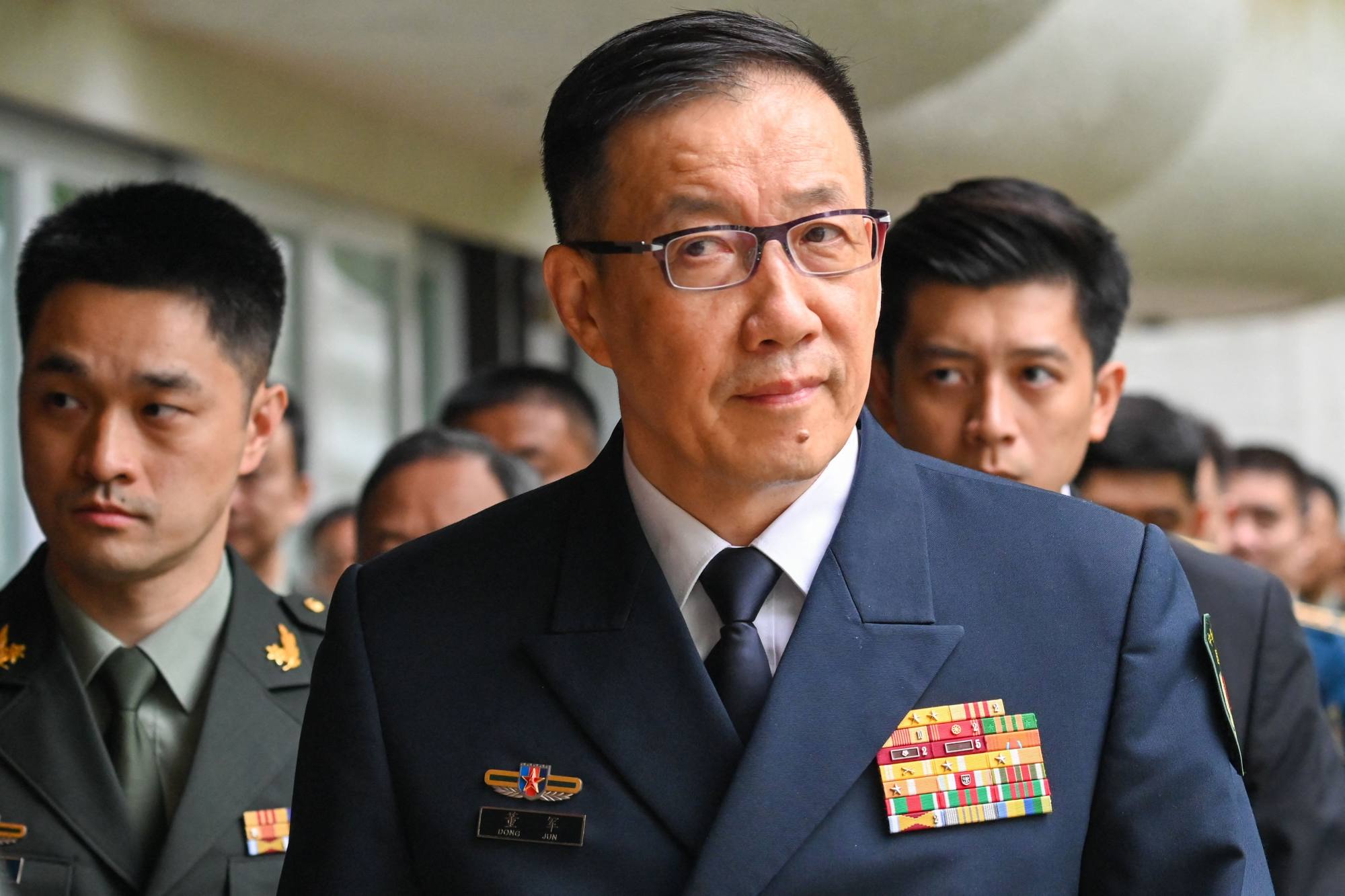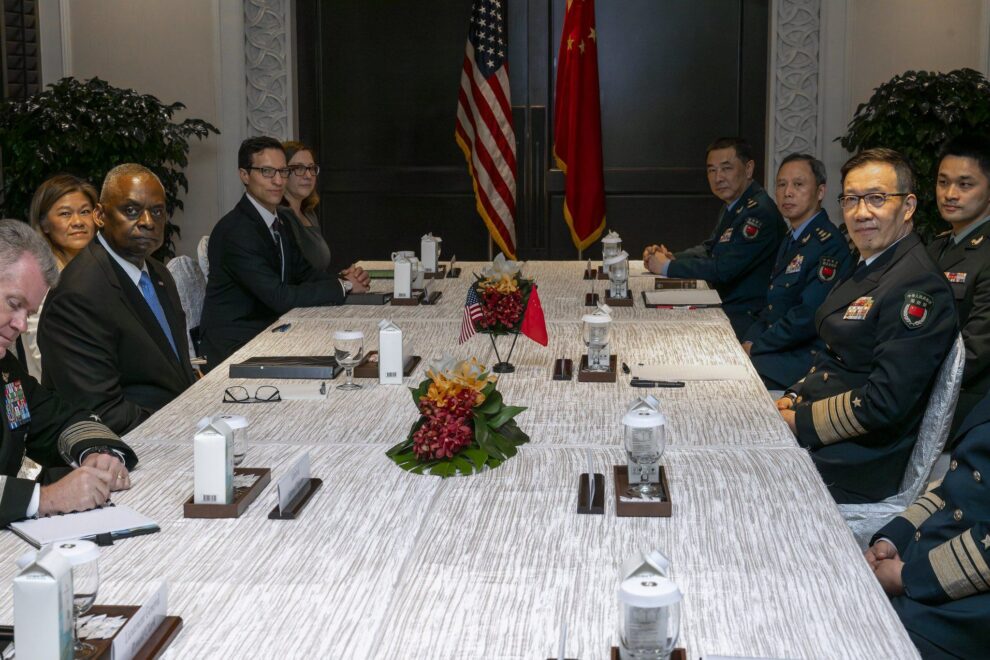The Chinese and US defence ministers held a bilateral meeting on the sidelines of the Shangri-La Dialogue in Singapore on Friday, the first in-person meeting between ministers since 2022.
Senior Colonel Wu Qian, a spokesman for China’s defence ministry, said the bilateral meeting between Dong Jun and Lloyd Austin was “positive, practical and constructive” communication at the strategic level.
He said that during the meeting, the two exchanged views, including on relations between the two militaries, Taiwan, the South China Sea and “the Ukraine crisis”.
The meeting had a “positive effect” on promoting understanding and avoiding miscalculation, Wu said in a press conference after the meeting, which he said lasted 75 minutes – longer than expected.
It included discussions about creating a crisis communications working group that Wu said was part of the “policy communication arrangements” agreed by the two sides to be carried out in the future.
Defence ministers from China and US meet on sidelines of Shangri-La Dialogue in Singapore
Dong also urged the United States to stop sending the “wrong signals” to Taiwanese independence forces and to “correct its mistakes”, according to Wu.
Beijing strongly opposed the US congratulating Taiwanese president William Lai Ching-te and sending a delegation to Taiwan to attend his inauguration ceremony on May 20, Wu added.
Dong told Austin the two militaries should adhere to the bottom line of “non-conflict and non-confrontation”, according to China’s defence ministry.
Regarding the South China Sea, Dong also accused the US of supporting the Philippines over its activities in the disputed Second Thomas Shoal and expressed strong opposition to the US deployment of a missile system in the country which he said was “a real threat to regional security”.
The US Department of Defence said Austin emphasised the “importance of maintaining open lines of military-to-military communication” between Washington and Beijing and “welcomed plans to convene a crisis-communications working group by the end of the year”.
Austin, however, also expressed “concern about recent provocative PLA activity around the Taiwan Strait”,reaffirming the importance of peace and stability near the self-ruled island.
“[Beijing] should not use Taiwan’s political transition – part of a normal, routine democratic process – as a pretext for coercive measures,” Austin said.
He also underscored the “importance of respect for high-seas freedom of navigation guaranteed under international law, especially in the South China Sea” and discussed “Russia’s unprovoked war against Ukraine and [China’s] role in supporting Russia’s defence industrial base”.
Chinese Lieutenant General He Lei said the talks showed that normal high-level exchanges between the two militaries had resumed, which was conducive to stabilising and improving ties between the two militaries.
“China’s new defence minister Dong Jun can reiterate China’s position on its core interests and major issues to Austin face to face, which will have a positive effect on enhancing the understanding between the leaders of the two militaries and controlling the risks of differences between the two militaries,” He said on the sidelines of the forum on Friday.

Each side brought 10 officials to the talks, officials said.
Benjamin Barton, an associate professor at the University of Nottingham’s Malaysia campus, said that while the defence ministers’ dialogue was “remarkable and speaks volumes of the hard work undertaken by both parties in building bridges and seeking to repair relations,” both sides were again declaring their respective red lines regarding the Taiwan Strait.
“It is important for Beijing to be seen – domestically – to be putting pressure on the new Taiwanese leadership, which it has been doing by upping the ante when it comes to undertaking training exercises around the island,” Barton said.
He said continued impetus was required from the top down to maintain momentum in restoring communication channels, which mattered when both militaries were involved in the same hotspots, such as the Taiwan Strait and South China Sea.
During that call they discussed various issues regarding the increasing military tensions between the two countries over major flashpoints, such as the South China Sea and the Taiwan Strait.
Relations have remained bitter since Beijing severed the military communication channel with Washington after Nancy Pelosi, who was US House speaker at the time, visited Taiwan in August 2022.
Friday’s meeting follows attempt to restore military communication channels after Chinese President Xi Jinping and US President Joe Biden met in San Francisco in November.
It marks the first time in two years the two countries’ defence ministers have met in person after Austin met then Chinese defence minister Wei Fenghe in November 2022 in Cambodia. Austin and Dong previously spoke over the telephone last month.
At last year’s Shangri-La Dialogue, Beijing refused bilateral talks with the US because Washington had imposed sanctions on Li Shangfu, who became defence minister in March last year and was ousted a few months later.
He was replaced by Dong in December.
The meeting comes amid rising military tensions in the Taiwan Strait.
Last week, the People’s Liberation Army conducted a two-day joint military drill focusing on blockading the main island of Taiwan in response to the inauguration of the new Taiwanese leader William Lai Ching-te.
Beijing sees Taiwan as part of China, to be reunited by force if necessary. Most countries, including the US, do not recognise Taiwan as an independent state, but Washington is opposed to any attempt to take the island by force, and is committed to arming it.
Trade and Taiwan discussed at 3-way summit for Chinese, Japanese and South Korean leaders
On Thursday, Beijing announced export controls on various military-related materials to take effect from July 1, which the Chinese commerce ministry said was to “safeguard national security and interests.”
A review by the South China Morning Post of customs data shows the US is among the largest importers of those products.
Dong also met Singaporea’s new Prime Minister Lawrence Wong on Friday and pledged to “build a new pattern of security cooperation” between the two countries.
Dong said China and Singapore had profound historical roots, similar cultures, compatible ideas and common interests, according to the Chinese defence ministry.










